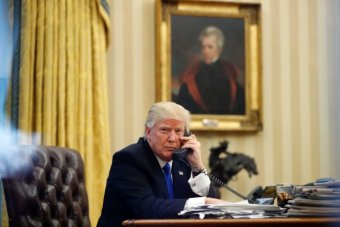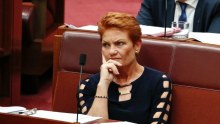Donald Trump's telephone tirade a wake-up call for Australia's defence relationship with US
Updated
Over a year ago, when Donald Trump was still battling to win the Republican Party's nomination, defence chiefs in Canberra were nervously watching his increasingly radical public pronouncements.
"This circus sideshow is really dragging on longer than I would've expected," one senior military leader noted at the time.
The comment was telling; no-one in the Australian Defence establishment or broader diplomatic community really believed Mr Trump had any chance of winning his party's nomination — let alone the White House.
Fast forward to the beginning of 2017 and the reality of Mr Trump is still yet to be fully appreciated by one of America's closest allies.
Mr Trump's declaration via Twitter that the proposed Australian refugee settlement arrangement struck with former president Barack Obama was a "dumb deal" has startled long-term observers of the ANZUS alliance.
"I've been watching the alliance relationship for more than 30 years now and I think this is as difficult a period as we've seen since the so-called MX missile crisis of the early 1980s," said Peter Jennings, the director of the Australian Strategic Policy Institute.
"I think it's sensible for us to be working through all manner of contingencies, which includes a temporary freezing of the alliance, a sort of lull in alliance cooperation," Mr Jennings warned.
"Ordinarily you'd say that was very unexpected, but I just think we've got to be prepared for any contingency under the new presidency".
Earlier this week, Australian officials seemed relieved that the new President had "agreed" to honour the deal struck by his predecessor, and Prime Minister Malcolm Turnbull was describing his weekend phone call with Mr Trump as "constructive".
"If Donald Trump had decided to rip up the refugee deal with Australia, it would have caused significant domestic embarrassment for the Federal Government, and close allies don't do that," one senior official remarked shortly after the leaders' conversation.
The burning question: What does the US get in return?
With the refugee deal appearing to have won Mr Trump's begrudging support, defence officials in Canberra are already anticipating what the US may ask of Australia in return.
"Trump's team has demonstrated that it is willing to show good will to Australia and down the track you'd expect Australia would be expected to also show good will to America," a senior official predicted.
Now as the future of the US resettlement arrangement hangs by a thread, Federal Government officials are scrambling to salvage it.
If by chance the contentious arrangement to send 1,250 refugees from Manus Island and Nauru is not scuttled by Mr Trump, what could the unpredictable leader ask of Australia in return?
Would Australia be pressured to join any future US-led military action against China in the South China Sea or do more in the Middle East?
Already the New York Times has speculated the recent rift between the leaders of the United States and Australia could play into Beijing's hands.
"The flare-up — and conflicting characterisations of the call from Mr Trump and Mr Turnbull — threatened to do lasting damage to relations between the two countries and could drive Canberra closer to China, which has a robust trading relationship with Australia and is competing with Washington to become the dominant force in the Asia-Pacific region," the newspaper warned on Thursday.
That scenario for now seems unlikely, but some in the diplomatic and defence community believe Mr Turnbull must quickly follow the leaders of Japan and Britain by trying to secure a face-to-face meeting with Mr Trump in Washington.
Just over fifty years ago, another Australian prime minister, Harold Holt, travelled to the White House to meet former president Lyndon Johnson, where he famously declared Australia was "all the way with L-B-J".
In 2017, a wiser motto for the Prime Minister would be "let's wait and see with D-J-T".
Topics: world-politics, defence-and-national-security, donald-trump, united-states, canberra-2600, australia
First posted









